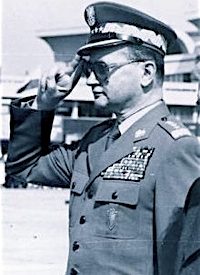
Wojeciech Jaruzelski (left) was the communist general who was defense minister of Communist Poland when striking shipyard workers were shot and killed in 1970. He also was the practical dictator of Poland when martial law was imposed in 1981. Like other communist dictators, Jaruzelski is complicit in a vast pattern of suppression of basic rights, arrest of dissidents, and the support of the triumph of communism in the free world.
Polish courts have put Jaruzelski on trial for some of his most obvious crimes, like the shooting of shipyard workers in 1970. Recently, however, his trial has been halted and perhaps ended permanently because of his ill health. The 88-year-old communist hack may die in the near future.
But the contrast in how communist brutes are dealt with and how those who collaborated with the Nazis were treated is stark and reveals the hypocrisy of these sorts of war crimes trials. It is impossible to fully grasp the horror of the Holocaust.
The Holocaust was a horrific crime, but the Holomodor (man-made famine) in the Ukraine was equally horrific, and the Gulag continued to hold millions of prisoners for the whole span of Bolshevik rule. Stories of young children dying of starvation and neglect in the Gulag in the 1980s was ignored by the establishment media but the crimes were real enough.
Which form of diabolic evil was worse, the Nazis or the Soviets? Khmer Rogue or the North Koreans? Red China under Mao may have reached deeper into the infernal regions of Hell on Earth, which is collectivism in practice. The poignant testimonies of those who endured the horrors of these regimes leave no doubt that justice requires punishment of the offenders.
So the crimes for which General Jaruzelski was being tried were real despite his nominal status, at one point, as President of Poland. In fact, the indictment against him could have been broader: He fought with the Red Army against the anti-communist Polish forces in 1945; he ordered Polish troops to invade Czechoslovakia in 1968; the same year, 1968, he began an anti-Semitic purge of the Polish military, which resulted in the demotion or discharge of more than 1,000 Jewish officers. The charges against Jaruzelski, instead, were narrowly defined to include actual crimes under Polish law, particularly the murder of 44 strikers in 1970.
But if clemency is shown to the aged, then one might expect that standard of justice should be uniform — but it is not. Ninety-one-year-old John Demjanjuk is a Ukrainian victim of Stalin’s Holomodor who was tried in Israel in 1988 and sentenced to death. Five years later, however, the sentence against Demjanjuk was reversed because the Israeli Supreme Court determined in 1993 that he may well have not been the camp guard as originally believed. In the American legal system, double jeopardy (under Amendment V) would have attached and further charges against Demjanjuk for these crimes would have been impermissible. But the frail old man, who had been tried and then released, was convicted this year by a German court and sentenced, effectively, to life imprisonment.
But it is not just in those two ways — treating elderly defendants who may not be able to grasp the trial and the fundamental problem of being tried for the same offense twice — that makes the Demjankuk and the Jaruzelski case show different applications of justice.
There is a credible argument that the evidence used to convict Demjankuk may have been provided by Soviet intelligence services as a way of punishing a man whose crime was not as a brutal inmate guard (for whom few would shed even crocodile tears), but rather as a “defector” from the Soviet Union. Prosecutors relied on a KGB interview summary with one Ignat Danilchenko, who said that he was a guard at Sobidor with Demjankuk, although Moscow had denied for years all requests for access to Danilchenko. The right to confront one’s accusers is also a fundamental part of our judicial system.
Jaruzelski, who will be allowed to walk away from crimes that few serious people question he committed, has been held to one standard of justice. Demjankuk, who is older than Jaruzelski and who lived through the ghastly Holomodor of the Ukrainian genocide and who also was tried twice for the same offense, has been held to quite another standard of justice. Both men (if Demjankuk was “Ivan the Terrible”) deserve punishment. Unfortunately, only the big shot, the one who is the man we know imposed tyranny on the Polish people, is walking away from his crimes.



